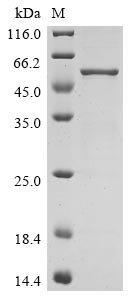Recombinant Bovine coronavirus Nucleoprotein (N) is produced in E.coli and contains the complete expression region spanning amino acids 1-448. The protein features a C-terminal 6xHis tag, which makes purification and detection more straightforward. SDS-PAGE analysis confirms the nucleoprotein is greater than 90% pure, suggesting it provides a high-quality reagent for research purposes. This product is intended for research use only, not for diagnostic or therapeutic applications.
The nucleoprotein of Bovine coronavirus appears to play a critical role in the virus's life cycle. It's primarily involved in packaging viral RNA and forming the ribonucleoprotein complex. As a key component in viral replication and assembly, it may represent an important target for studies examining viral pathogenesis and host-virus interactions. This protein is likely valuable for research aimed at understanding coronavirus biology and developing antiviral strategies.
Potential Applications
Note: The applications listed below are based on what we know about this protein's biological functions, published research, and experience from experts in the field. However, we haven't fully tested all of these applications ourselves yet. We'd recommend running some preliminary tests first to make sure they work for your specific research goals.
Bovine coronavirus Nucleoprotein (N) is a viral RNA-binding protein that requires precise folding, oligomerization, and proper domain formation for its functional activity in viral replication. The E. coli expression system is prokaryotic and may not provide the optimal folding environment for this eukaryotic viral protein, potentially lacking necessary chaperones or post-translational modifications. While the C-terminal 6xHis tag may cause minimal interference, the probability of correct folding with full RNA-binding and oligomerization capability requires experimental validation.
1. Antibody Development and Validation Studies
This application is highly suitable as antibody development primarily relies on antigenic sequence recognition rather than functional protein folding. The full-length protein provides comprehensive epitope coverage for generating both linear and potential conformational antibodies. The high purity ensures minimal contamination-related cross-reactivity.
2. Protein-Protein Interaction Studies
This application carries a significant risk without proper folding validation. Nucleoprotein interactions with other viral proteins or host factors require precise tertiary and quaternary structure. If misfolded, the protein may exhibit non-specific binding or fail to replicate genuine physiological interactions.
3. Biochemical Characterization and Biophysical Analysis
These studies are essential for determining folding status and quality. Techniques can assess oligomerization state, thermal stability, and structural integrity, providing critical data for validating the protein preparation regardless of functional activity.
4. Comparative Coronavirus Research
This application requires proper folding validation for structural comparisons. While sequence-based comparisons are feasible, functional and structural comparisons would be invalid with a misfolded protein. Cross-reactivity studies may still provide evolutionary insights.
Final Recommendation & Action Plan
The E. coli expression system may not fully support the correct folding of this viral nucleoprotein, necessitating experimental validation before functional applications. Begin with Application 3 (Biochemical Characterization) to assess oligomerization state via size-exclusion chromatography and structural integrity via circular dichroism spectroscopy. Once folding is verified, proceed cautiously with Applications 2 and 4 for interaction studies and comparative research. Application 1 (antibody development) can proceed immediately. If misfolding is detected, limit use to antibody production and basic biophysical characterization. For reliable functional studies, consider eukaryotic expression systems that better support viral protein folding.






